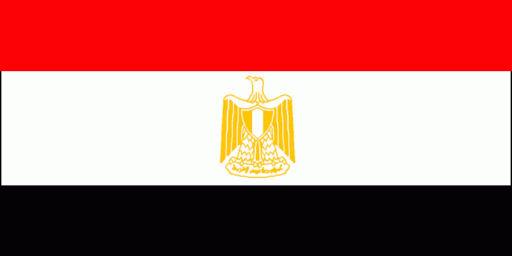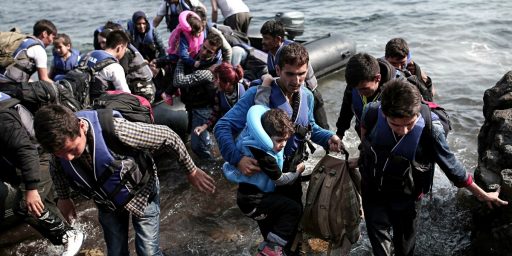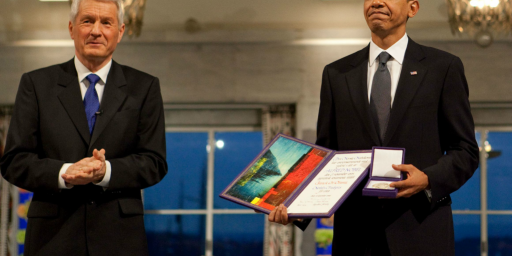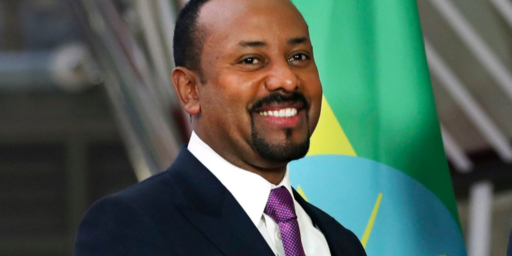ElBaradei and IAEA Awarded Nobel Peace Prize
Mohamed ElBaradei and the International Atomic Energy Agency were awarded the Nobel Peace Prize today for their opposition to the Bush Administration unsuccessful efforts to stop the spread of nuclear weapons.
IAEA, ElBaradei Share Nobel Peace Prize (AP)
Mohamed ElBaradei and the International Atomic Energy Agency that he heads won the 2005 Nobel Peace Prize Friday for their efforts to stop the spread of nuclear weapons. ElBaradei, a 63-year-old lawyer from Egypt, has headed the U.N. nuclear agency as it grappled with the crisis in Iraq and the ongoing efforts to prevent North Korea and Iran from acquiring nuclear weapons.
The Nobel Committee said ElBaradei and the IAEA should be recognized for addressing one of the greatest dangers facing the world. “At a time when the threat of nuclear arms is again increasing, the Norwegian Nobel Committee wishes to underline that this threat must be met through the broadest possible international cooperation. This principle finds its clearest expression today in the work of the IAEA and its director general.”
ElBaradei, who was reappointed last month to a third term, has had to contend with U.S. opposition to his tenure. Much of the opposition stemmed from Washington’s perception that he was being too soft on Iran for not declaring it in violation of the Nuclear Nonproliferation Treaty. That stance blocked a U.S. bid to haul Tehran before the U.N. Security Council for more than two years.
He also refused to endorse Washington’s contention that Iran was working to make nuclear weapons and disputed U.S. assertions that Saddam Hussein’s regime in Iraq had an active atomic weapons program — both claims that remain unproven, despite growing suspicions about Tehran’s nuclear agenda.
In recent years especially, the Nobel committee has awarded the Peace Prize on rather dubious grounds, often to make a political statement rather than to recognize general achievement. There were certainly better choices this year.
Still, while the likes of Yasir Arafat show up on the list from time-to-time, most of the recipients are indeed worthy. Jimmy Carter won for the wrong reasons in 2003 but almost certainly deserved the prize for other efforts, notably the Camp David Accords and his efforts at monitoring elections overseas. A full list of Peace Prize winners are in the extended entry.
Update: ElBaradei: Peace Prize a “shot in the arm” (Reuters)
U.N. nuclear watchdog head Mohamed ElBaradei said on Friday winning the 2005 Nobel Peace Prize would give him and his agency a much-needed “shot in the arm” as they tackle nuclear crises in Iran and North Korea. ElBaradei said he had been certain he would not win, despite being favored, because he had not received the traditional advance telephone call from the Nobel Committee. He only learned of his win while watching the televised ceremony.
The 63-year-old Egyptian lawyer and the International Atomic Energy Agency won the 2005 Nobel Peace Prize for their efforts to prevent both the spread of nuclear weapons, to new states and to terrorists, and to ensure safe civilian use of nuclear energy.
“The award sends a very strong message: ‘Keep doing what you are doing — be impartial, act with integrity’, and that is what we intend to do,” ElBaradei told a news conference in Vienna.
I’m not sure that’s the message sent by this award.
Note: The hyperlinks don’t work, as they are truncated and attempt to find the pages at OTB rather than the Nobel site.
1901 Peace, Henry Dunant
Peace, Frédéric Passy
1902 Peace, Élie Ducommun
Peace, Albert Gobat
1903 Peace, Randal Cremer
1904 Peace, Institute of International Law
1905 Peace, Bertha von Suttner
1906 Peace, Theodore Roosevelt
1907 Peace, Ernesto Teodoro Moneta
Peace, Louis Renault
1908 Peace, Klas Pontus Arnoldson
Peace, Fredrik Bajer
1909 Peace, Auguste Beernaert
Peace, Paul Henri d’Estournelles de Constant
1910 Peace, Permanent International Peace Bureau
1911 Peace, Tobias Asser
Peace, Alfred Fried
1912 Peace, Elihu Root
1913 Peace, Henri La Fontaine
1917 Peace, International Committee of the Red Cross
1919 Peace, Woodrow Wilson
1920 Peace, Léon Bourgeois
1921 Peace, Hjalmar Branting
Peace, Christian Lange
1922 Peace, Fridtjof Nansen
1925 Peace, Sir Austen Chamberlain
Peace, Charles G. Dawes
1926 Peace, Aristide Briand
Peace, Gustav Stresemann
1927 Peace, Ferdinand Buisson
Peace, Ludwig Quidde
1929 Peace, Frank B. Kellogg
1930 Peace, Nathan Söderblom
1931 Peace, Jane Addams
Peace, Nicholas Murray Butler
1933 Peace, Sir Norman Angell
1934 Peace, Arthur Henderson
1935 Peace, Carl von Ossietzky
1936 Peace, Carlos Saavedra Lamas
1937 Peace, Robert Cecil
1938 Peace, Nansen International Office for Refugees
1944 Peace, International Committee of the Red Cross
1945 Peace, Cordell Hull
1946 Peace, Emily Greene Balch
Peace, John R. Mott
1947 Peace, Friends Service Council
Peace, American Friends Service Committee
1949 Peace, Lord Boyd Orr
1950 Peace, Ralph Bunche
1951 Peace, Léon Jouhaux
1952 Peace, Albert Schweitzer
1953 Peace, George C. Marshall
1954 Peace, Office of the United Nations High Commissioner for Refugees
1957 Peace, Lester Bowles Pearson
1958 Peace, Georges Pire
1959 Peace, Philip Noel-Baker
1960 Peace, Albert Lutuli
1961 Peace, Dag Hammarskjöld
1962 Peace, Linus Pauling
1963 Peace, International Committee of the Red Cross
Peace, League of Red Cross Societies
1964 Peace, Martin Luther King
1965 Peace, United Nations Children’s Fund
1968 Peace, René Cassin
1969 Peace, International Labour Organization
1970 Peace, Norman Borlaug
1971 Peace, Willy Brandt
1973 Peace, Le Duc Tho
Peace, Henry Kissinger
1974 Peace, Seán MacBride
Peace, Eisaku Sato
1975 Peace, Andrei Sakharov
1976 Peace, Mairead Corrigan
Peace, Betty Williams
1977 Peace, Amnesty International
1978 Peace, Anwar al-Sadat
Peace, Menachem Begin
1979 Peace, Mother Teresa
1980 Peace, Adolfo Pérez Esquivel
1981 Peace, Office of the United Nations High Commissioner for Refugees
1982 Peace, Alfonso GarcÃa Robles
Peace, Alva Myrdal
1983 Peace, Lech Walesa
1984 Peace, Desmond Tutu
1985 Peace, International Physicians for the Prevention of Nuclear War
1986 Peace, Elie Wiesel
1987 Peace, Oscar Arias Sánchez
1988 Peace, United Nations Peacekeeping Forces
1989 Peace, The 14th Dalai Lama
1990 Peace, Mikhail Gorbachev
1991 Peace, Aung San Suu Kyi
1992 Peace, Rigoberta Menchú Tum
1993 Peace, F.W. de Klerk
Peace, Nelson Mandela
1994 Peace, Yasser Arafat
Peace, Shimon Peres
Peace, Yitzhak Rabin
1995 Peace, Pugwash Conferences on Science and World Affairs
Peace, Joseph Rotblat
1996 Peace, Carlos Filipe Ximenes Belo
Peace, José Ramos-Horta
1997 Peace, International Campaign to Ban Landmines
Peace, Jody Williams
1998 Peace, John Hume
Peace, David Trimble
1999 Peace, Médecins Sans Frontières
2000 Peace, Kim Dae-jung
2001 Peace, United Nations
Peace, Kofi Annan
2002 Peace, Jimmy Carter
2003 Peace, Shirin Ebadi
2004 Peace, Wangari Maathai
2005 Peace, Mohamed ElBaradei
Peace, International Atomic Energy Agency






It’s just like Hollywood. Give people awards for doing a crappy job, to escape from reality…
Next year, the Nobel Prize in Physics goes to Professor Frink from the Simpsons for his Perpetual Motion research.
This could be the first double Nobel-IgNobel prize winner.
This should provide with humor for at least a month or so.
The next Nobel prize should go to the UN for their handling of the Oil for Food program, (Economics)
You know Herb, your response is a hoot. But, the more I thought about it, after today’s announcement……..
I think it should have gone jointly to the President of Iran and Kim Jong Il for their joint efforts in spreading the peaceful use of nuclear power.
I would have given it to the president of East Timor, a forget guerilla who has forsaken armed conflict, pushed forward elections, and looks like he’ll step aside when his term is over.
James:
I’m sure we disagree about this in general, but it seems to me that there is a very good case to be made that the IAEA has been on target, and that many of the disagreements of fact that the IAEA has with hardliners in the Bush administration are partly a question of evidence, but also partly due to internal administration pressures to read things a certain way.
And however that may be, the IAEA is an important organization for the ways in which it provides cover for local elites to pressure administrations to give up their nuclear ambitions. Unilateral military force (or, more precisely, the now somewhat hollow threat of unilateral military force from the US) isn’t going to do that alone.
Brett:
I would bet that you don’t remember to much about the Korean war. Had you been born yet?
I would also bet that you don’t know much about the Iranian hostage crisis. If you were born then, how old were you at that time?
I remember both of those times well, and I have seen how these countries lie, cheat and steal until the get their way.
You can beleive me when I tell you that Military Force is the only thing those dictators of their countries know. Both of these countries are long overdue for a swift kick in the rear end by the military